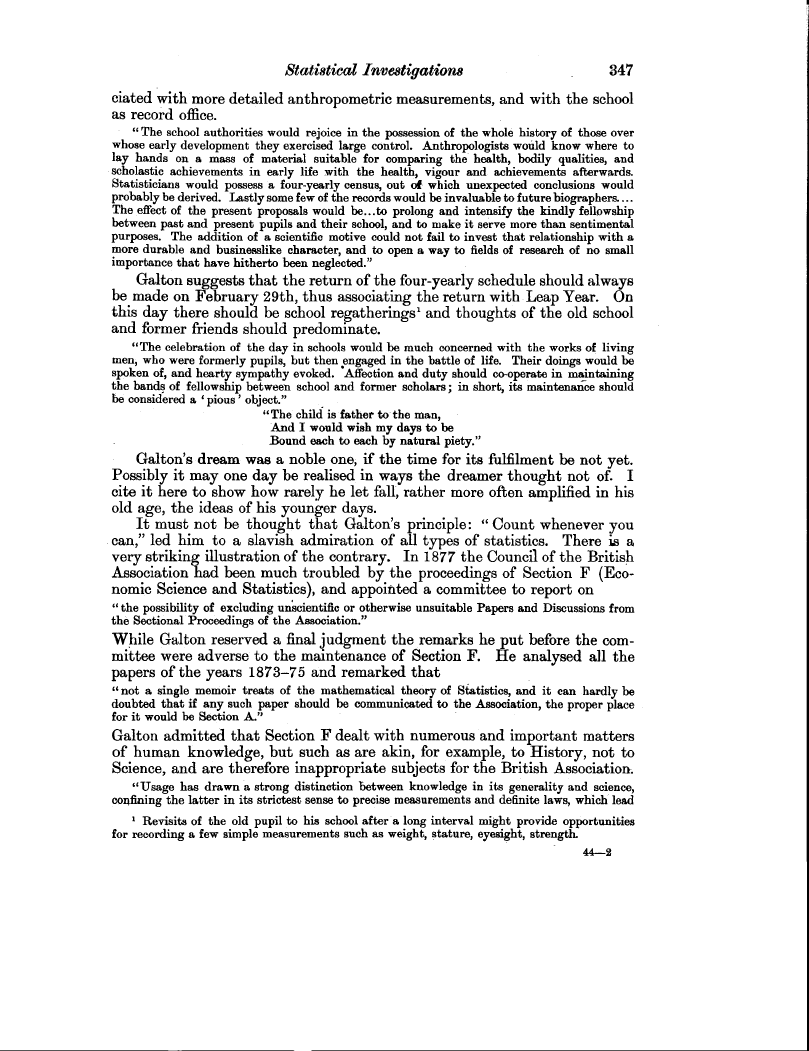Statistical Investigations 347
ciated with more detailed anthropometric measurements, and with the school as record office.
"The school authorities would rejoice in the possession of the whole history of those over whose early development they exercised large control. Anthropologists would know where to lay hands on a mass of material suitable for comparing the health, bodily qualities, and scholastic achievements in early life with the health, vigour and achievements afterwards. Statisticians would possess a four-yearly census, out of which unexpected conclusions would probably be derived. Lastly some few of the records would be invaluable to future biographers.... The effect of the present proposals would be ... to prolong and intensify the kindly fellowship between past and present pupils and their school, and to make it serve more than sentimental purposes. The addition of a scientific motive could not fail to invest that relationship with a more durable and businesslike character, and to open a way to fields of research of no small importance that have hitherto been neglected."
Galton suggests that the return of the four-yearly schedule should always be made on February 29th, thus associating the return with Leap Year. On this day there should be school regatherings' and thoughts of the old school and former friends should predominate.
"The celebration of the day in schools would be much concerned with the works of living men, who were formerly pupils, but then engaged in the battle of life. Their doings would be spoken of, and hearty sympathy evoked. Affection and duty should co-operate in maintaining the bands of fellowship between school and former scholars; in short, its maintenance should be considered a ' pious' object."
"The child is father to the man,
And I would wish my days to be Bound each to each by natural piety."
Galton's dream was a noble one, if the time for its fulfilment be not yet. Possibly it may one day be realised in ways the dreamer thought not of. I cite it here to show how rarely he let fall, rather more often amplified in his old age, the ideas of his younger days.
It must not be thought that Galton's principle: " Count whenever you can," led him to a slavish admiration of all types of statistics. There is a very striking illustration of the contrary. In 1877 the Council of the British Association had been much troubled by the proceedings of Section F (Economic Science and Statistics), and appointed a committee to report on
" the possibility of excluding unscientific or otherwise unsuitable Papers and Discussions from the Sectional Proceedings of the Association."
While Galton reserved a final judgment the remarks he put before the committee were adverse to the maintenance of Section F. He analysed all the papers of the years 1873-75 and remarked that
" not a single memoir treats of the mathematical theory of Statistics, and it can hardly be doubted that if any such paper should be communicated to the Association, the proper place for it would be Section A."
Galton admitted that Section F dealt with numerous and important matters of human knowledge, but such as are akin, for example, to History, not to Science, and are therefore inappropriate subjects for the British Association.
"Usage has drawn a strong distinction between knowledge in its generality and science, cox;fiuing the latter in its strictest sense to precise measurements and definite laws, which lead
' Revisits of the old pupil to his school after a long interval might provide opportunities for recording a few simple measurements such as weight, stature, eyesight, strength.
44-2

